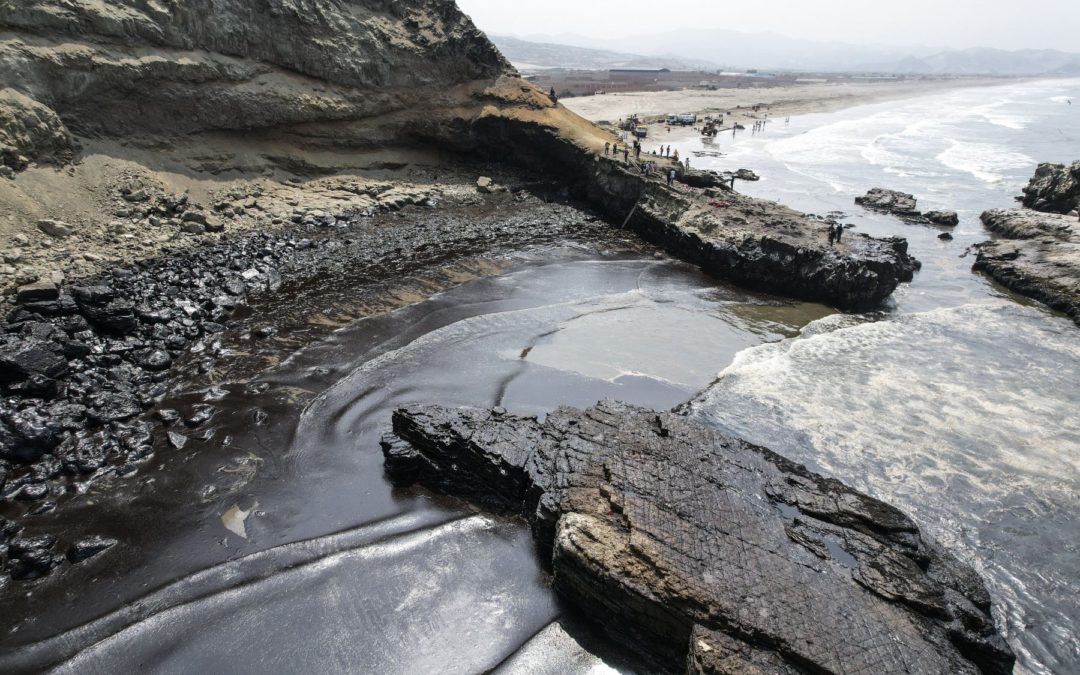- Two important events came together this week concerning the latest oil spill on the Peruvian coasts: the visit to Peru of the United Nations (UN) Special Rapporteur on Toxic Substances and Human Rights, and the publication of the report of the UN Experts on Mission regarding the latest spill, where recommendations for the improvement of information, participation, and transparency concerning this event were made.
- DAR has made proposals to international bodies, such as the Extractive Industries Transparency Initiative (EITI), to address the lack of transparency concerning the spill.
February 23, 2022 – This week, the UN Special Rapporteur on Toxic Substances and Human Rights, Marcos Orellana, is on an official visit to Peru, adding the latest oil spill off the Peruvian coast to his agenda.
In this regard, Vanessa Cueto, vice-president of DAR, calls on the UN representative: «We urge the Rapporteur to issue a statement to the Peruvian State demanding transparent remediation, and specifying recommendations for institutional improvements in the Peruvian extractive and environmental sector based on the lessons learned from the spill, based on what was stated in the report of the UN Experts on Mission regarding the spill.”
This is because the Rapporteur’s visit coincides with the recent dissemination of the report of the Experts on Mission. The report mentions that «from a humanitarian and socioeconomic perspective, the response (to the spill) has been sporadic and poorly organized.»(1)This is because the affected population has not received timely and accurate information, and no unified statement or participation mechanisms have been considered. DAR had already warned about this point in a recent article. The report also highlights that no damage assessment or requirements analysis has been carried out for the affected population.
The Experts on Mission also identified 24 recommendations, including the implementation of an Incident Command System, which is an intersectoral and joint venture between the State and the company; a record of the affected population, to be prepared by INDECI and EDAN; a post-disaster requirements analysis, to be prepared by PCM, INDECI, and the UN; an Environmental Monitoring Plan; and a Work and Communication Plan with the affected communities, to be prepared by the State and the company.
International Alert
The alert about the lack of transparency linked to the spill has already been raised before other international bodies, such as the Extractive Industries Transparency Initiative (EITI). DAR presented its concerns and proposals to the International Board of this initiative, on which both Peru and REPSOL participate. In his intervention, Cesar Gamboa, the executive director of DAR, pointed out that the spill of twelve thousand barrels of oil in Peruvian waters due to Repsol’s lack of care has been aggravated by the latter’s lack of transparency and the evasion of its responsibility for the environmental harm caused. Repsol hid information, saying that at first it was just a few gallons. Secondly, they said that they had it under control. Lastly, they said that their mitigation system didn’t work. The impacts include dozens of species of flora and fauna being affected, but there is also an economic impact, as a thousand families have nowhere to work because they are artisanal fishermen, which also affects tourism. He pointed out that REPSOL must be transparent about the expenses and actions for compensation and support to the local population, such as the fishermen guilds, gastronomy associations, and tourist services, within the framework of the legal obligations that the company must repair the harm caused.
Finally, Gamboa emphasized that it is important for the EITI, as well as for the countries, to continue promoting environmental transparency so that the government and companies assume greater investment commitments to reduce environmental and social impacts.
The Background
Let us recall that the last oil spill on January 15 made clear a repetitive cycle of lack of transparency on the part of REPSOL: (i) regarding the severity of the spill: from declaring 7 gallons or 0.16 barrels spilled (France24), to almost 12,000 barrels (El Comercio); (ii) regarding the origin of the spill: from declaring that it was caused by an abnormal surge due to the eruption of the Tonga volcano, to indicating that the underwater pipeline that is part of the terminal’s system (PLEM) may have broken, and that it didn’t only suffer from a crack or corrosion in the underwater pipes (this, linked to the lack of maintenance by the company) (Ojo Público); (iii) regarding its first response action plan: it was not transparent about the place of disposal, nor the management that would be given to the waste (Andina); and (iv) regarding the compensations: Repsol claims to have signed “collaboration” agreements with fishermen’s associations that benefit more than 3,350 people (Repsol), but has not disclosed the content of such agreements.
In addition, the company aggravated the pollution caused by the oil spill through its actions due to its lack of an adequate immediate response: it sent 15 workers to clean up the oil with brooms and dustpans when the spill had reached more than 100 km of coastline (Gestión, Público). Moreover, there is no information about why the company did not react diligently to the alerts issued by the captain of the vessel Mare Doricum, nor in general what it did immediately to stop the oil leak (La República).
This lack of transparency is already being recognized in open proceedings. For example, the order to prevent four Repsol executives from leaving the country decreed by a Ventanilla court at the end of January considered the falsification of information by the company as an aggravating circumstance. (Salud con Lupa).
—
(1) See p. 22 of the Report (Spanish)


